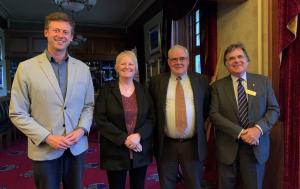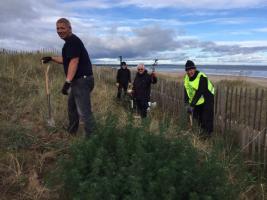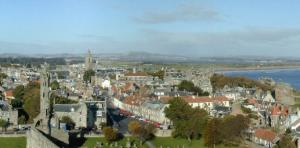Speaker - Jim Allison. Whales, Bales and Sails, the Port of Dundee in the 19th Century
Tue, Jul 3rd 2018 at 7:00 pm - 8:30 pm
.jpg)
In the absence of the boss, Senior Vice President John Fernie chaired the meeting and welcomed guests including Ken Morris and potential new member Katie Mitchell.
He then reported on the great success of this year’s charity putting competition at The Ladies Putting Club on the Himalayas.
The event raised £500 which will be donated to local charities. Organiser Gordon Rhind thanked all of those who had taken part – members, families, friends from other Rotary Clubs.
Winner of the individual putting competition was Club member Iain MacKinnon, with guest Robbie Asgill in second place. The team prize went to Team MacKinnon, comprising Iain, Jean MacKinnon, Robbie Asgill and Dr Peter Ball.
As three of the team were also fortunate in going on to pick up some of the top raffle prizes, there were some mutterings of a “fix” being in place! However, you pays your money and you takes your chance!!
Member Jim Allison then regaled the company with tales of his home town of Dundee in a presentation entitled “Whales, Bales and Sails”.
Jim, whose family had owned and run a ships’ chandlery at Dundee Docks for more than 100 years from the mid-19thcentury, first told of Dundee’s growth in the textile industry becoming the prime manufacturing site and exporter of jute.
As the city expanded rapidly, by the beginning of the 20thcentury some 50,000 workers were employed in Dundee jute factories.
The bulk of the workers were women and children – cheaper labour – which led to men being known as “kettleboilers”, as they were essentially house husbands.
Textile manufacture had begun in the city with linen production as far back as the 15thcentury and became hugely profitable and the jute trade even more so when Dundee was known worldwide as “Juteopolis”. As a consequence, in those times it was recognised that Broughty Ferry had more millionaires than anywhere in the UK outside London.
As the raw jute fibre required water and oil mixtures to make it malleable enough to produce finished products, Dundee as a natural harbour with good access to the Arctic whaling grounds also grew in that industry. Whale oil became an important source for jute production and as a fuel.
In 1859 the first steam-powered whaler, The Narwhal, was built in Dundee. So shipbuilding also became a major part of the city’s enormous expansion as a worldwide centre for all three trades.
Of course, it is well-known that Captain Robert Scott’s ship The Discovery was constructed by the firm Dundee Shipbuilders in 1901.
The last Dundee shipbuilders, Caledon, eventually closed down in 1983.
In conclusion, Jim produced a fascinating item, a 5-foot long telescope which had been owned by his grandfather. He would use it in his Newport home to keep an eye on his workers – one and half miles away across the Tay in Dundee docks!
Marilyn Rhind proposed the vote of thanks for a fascinating talk in which all present found something new to hear and learn.
'What We Do' Main Pages:

.jpg)


